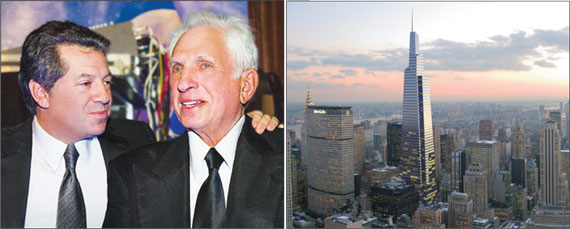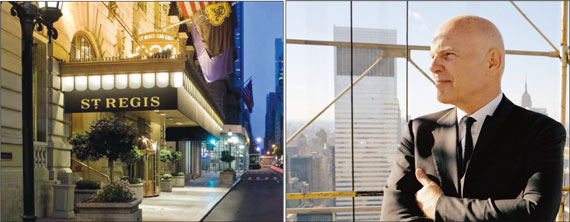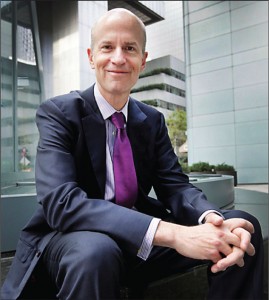From SL Green securing TD Bank as anchor tenant at its planned One Vanderbilt office tower to Vornado Realty Trust using the proceeds from its $605 million sale of 1740 Broadway to acquire the St. Regis Hotel’s retail condo, 2014 was an active, and lucrative, year for the city’s largest real estate investment trusts chair — and their top brass was rewarded handsomely in return.
The top executives at three of New York’s most prominent commercial REITs —SL Green, Vornado and Boston Properties — saw total compensation jump almost 14 percent year-over-year in 2014, according to filings with the Securities and Exchange Commission submitted last month.
The three firms’ CEOs alone took home combined pay hikes of more than 25 percent, and SL Green’s Marc Holliday made the New York Times/Equilar 200 Highest-Paid CEO Rankings list this year, at number 119. (Douglas Elliman Chairman Howard Lorber, the CEO of Vector Group, also made the list, at No. 23, taking home $28.6 million. Vector is Elliman’s parent company, but is not a REIT.)
While the steep pay hikes for top executives at these publicly traded companies is notable, it isn’t arbitrary. From performance incentives to stock awards, there are a variety of factors that played into the size of the compensation package doled out by each REIT.

From left: SL Green CEO Marc Holliday and Chairman Stephen Green (Photo: Steve Friedman) and a rendering of One Vanderbilt
SL Green Realty
New York’s largest office landlord also paid out the largest executive compensation packages in 2014. Holliday took home nearly $16.4 million in 2014, up 29 percent from $12.7 million in 2013.
The company’s president, Andrew Mathias, earned just under $11 million last year, an 18.4 percent increase from $9.3 million in 2013, while Chairman Stephen Green’s total compensation of $5.4 million represented a 0.9 percent drop from the previous year.
All three saw the bulk of their earnings from stock awards, which are in part tied to goals laid out in the company’s 2011 performance plan. Such awards constituted almost $14.2 million, or 86 percent, of Holliday’s compensation, as well as $10.2 million, or 93 percent, of Mathias’ earnings and $4.5 million, or 83 percent, of Green’s pay.
SL Green said in its SEC filing that the company “achieved maximum performance” by returning more than $2.6 billion to stockholders over the past three years. In addition, the board’s compensation committee granted additional shares to the executives “in recognition of our strong continued stock price appreciation.” SL Green shares rose 29.4 percent in 2014, topping the 11.4 percent gain for the Standard & Poor’s 500.
The REIT, which held 43.6 million square feet of property in Manhattan as of
March 31, did exceptionally well according to the criteria it set out for 2014. For example, it exceeded “maximum” performance levels by signing more than 2 million square feet of Manhattan leases, exceeding 96 percent same-store Manhattan portfolio occupancy and surpassing $400 million in office property acquisitions.
The company pointed to its performance under Holliday’s stewardship over 10 years in justifying the lofty executive pay, noting that SL Green’s enterprise value — broadly defined as its market capitalization when factoring in debt, preferred shares and cash on hand — has grown 574 percent, to $22.4 billion, since Holliday took over in January 2004. The company also cited Holliday’s leadership as “critical to the successful operation of our business.”

The St. Regis Hotel retail condo, one of Vornado CEO Steven Roth’s (right) biggest 2014 deals.
Vornado Realty Trust
Vornado Chairman and CEO Steven Roth pocketed $9.8 million in total compensation in 2014, a 34 percent jump from the $7.3 million he took home the prior year, the company disclosed. David Greenbaum, president of the REIT’s New York division, saw his pay jump 22 percent, to $5.4 million, last year.
Roth’s base salary of $1 million in 2014 remained unchanged, despite the Vornado founder having succeeded Michael Fascitelli as CEO in April 2013. Roth did, however, receive a $1 million bonus last year that may be related to the CEO role — his 2013 bonus was just $20,900. Yet both he and Greenbaum also took home the bulk of their earnings in the form of stock and performance-based awards.
Similar to SL Green and other REITs, Vornado uses an executive compensation structure determined by both “the company’s performance during the year and a review of the prevailing competitive market for executive talent,” its filing said. Vornado noted that no executive receives a base salary over $1 million, and the REIT requires that 50 percent of stock grants to senior management be in performance-based equity awards.
The firm gauged its performance using total return to shareholders, a measure that includes stock gains and dividends of 36.4 percent in 2014, which outperformed its key benchmark, the Morgan Stanley REIT Index.
Roth also led the firm through the sale of more than $900 million in non-core assets and $850 million in acquisitions in New York City.
Vornado maintained that its compensation program helped its long-term performance, noting that its 10-year total shareholder return of 131.1 percent through 2014 outperformed both the Morgan Stanley REIT Index’s 122.2 percent return and the S&P 500’s 109.5 percent return in the same period.
Vornado also cited an annual short-term incentive program for top executives tied to comparable FFO, or funds from operations, a key measure of profitability in the REIT industry. Vornado’s comparable FFO stood at more than $980 million in 2014, up 9.3 percent from $897 million in 2013.
Boston Properties

Boston Properties CEO Owen Thomas
The Boston-based REIT, which holds 11.6 million square feet of property in New York City including a majority stake in the GM Building at 767 Fifth Avenue, awarded CEO Owen Thomas $8.3 million in 2014. Thomas, who became CEO in April 2013, made roughly $5.6 million the previous year, and his $8.3 million in total compensation represented a 10 percent increase over his 2013 salary on an annualized basis, according to the company’s filing. President Douglas Linde also saw a 10 percent jump in his total compensation last year, to $6.8 million.
Boston Properties also pointed to its “strong 2014 performance” in analyzing the compensation packages: The REIT exceeded corporate goals for diluted funds from operations by booking $5.38 per share, while also surpassing $1 billion in property sales and leasing more than 6 million square feet.
In addition, the REIT’s compensation committee considered $1.5 billion of new developments that are currently 86 percent leased, as well as another $2.1 billion in development underway, in evaluating executive performance last year. Boston Properties also noted that its shares outperformed the S&P 500, the MSCI REIT Index and other industry indices over the last year, five- and 10-year periods.
Long-term incentive stock awards represented 67 percent of Thomas’ compensation in 2014, while cash bonuses were 24 percent. For the rest of the company’s executive officers, long-term incentive equity awards comprised just over 63 percent of total compensation, with cash bonuses representing 25 percent.
Boston Properties said in its proxy statement that it believes its compensation policies “are generally intended to encourage executives to focus on achieving long-term objectives.”
